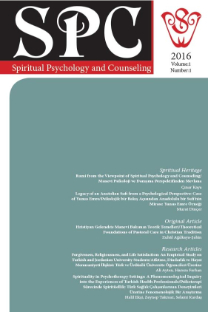Francis FELIX, Mary FRANKLIN SMITH, William Rhys JONES, Sarah PARKER, Vishal SHARMA, Charlotte SKIDMORE, Thomas M. KELLEY
The Efficacy of Health Realization/Innate Health Psycho-education For Individuals With Eating Disorders: Pilot Study
Eating disorders are associated with high rates of mortality, disability, and poor motivation for change. Psychological therapies are the first line treatment, yet outcomes are poor, and drop- out rates high. Health Realization/Innate Health (HR/IH) psycho-education offers an alternative intervention which can be delivered in groups engaging participants’ innate capacity for well- being and resilience. Eight female participants with anorexia nervosa (mean age 27.75, SD 14.34) from the CONNECT Eating Disorders Service, United Kingdom attended and completed a 15 session HR/IH psycho-educational group facilitated by two HR/IH trained therapists in this pre-experimental, multiple single-case design pilot study. Standard general psychiatric and eating disorders clinical outcome measures were administered immediately before and after the group, and the quantitative data compared using SPSS. Qualitative feedback was gathered using a feedback questionnaire immediately after the group. Comparison of quantitative data indicated statistically significant improvement in participants’ weight (p=0.04), body mass index (BMI; p=0.04), and Eating Disorder Examination Questionnaire (EDEQ) global mean score (p=0.04). Clinically significant positive changes were also noted for Rosenberg’s Self- Esteem Scale (pre-mean=8.8; post-mean=11.9), Clinical Outcomes in Routine Evaluation (CORE; pre-mean=1.6; post-mean=1.4), and Eating Disorders Quality of Life Scale (EDQLS; pre-mean=2.0; post-mean=1.4). High levels of participant and carer satisfaction and acceptability were also demonstrated. The HR/IH psycho-educational approach warrants further study as a brief intervention for adults with eating disorders.
___
- Arcelus, J., Mitchell, A. J., Wales, J., & Nielsen, S. (2011). Mortality rates in patients with anorexia nervosa and other eating disorders. A meta-analysis of 36 studies. Archives of general psychiatry, 68(7), 724–731. https://doi.org/10.1001/archgenpsychiatry.2011.74
- Banerjee, K., Howard, M., Manheim, K., & Beattie, M. (2007). Comparison of health realization and 12-step treatment in women’s residential substance abuse treatment programs. American Journal of Drug and Alcohol Abuse, 33(2), 207–215. https://doi.org/10.1080/00952990601174758
- Banks, S. (1998). The missing link. Lone Pine.
- Banks, S. (2001). The enlightened gardener. Lone Pine.
- Banks, S. (2005). The enlightened gardener revisited. Lone Pine.
- Barkham, M., Gilbert, N., Connell, J., Marshall, C., & Twigg, E. (2005). Suitability and utility of the CORE-OM and CORE-A for assessing the severity of presenting problems in psychological therapy services based in primary and secondary care settings. British Journal of Psychiatry, 186, 239–246. https://doi.org/10.1192/bjp.186.3.239
- Berg, K. C., Peterson, C. B., Frazier, P., & Crow, S. J. (2012). Psychometric evaluation of the eating disorder examination and eating disorder examination-questionnaire: A systematic review of the literature. International Journal of Eating Disorders, 45(3), 428–438. https://doi.org/10.1002/eat.20931
- Button, E. J., Chadalavada, B., & Palmer, R. L. (2010). Mortality and predictors of death in a cohort of patients presenting to an eating disorders service. International Journal of Eating Disorders, 43, 387–392. https://doi.org/10.1002/eat.20715
- Crow, S. J., Peterson, C. B., Swanson, S. A., Raymond, N. C., Specker, S., Eckert, E. D., & Mitchell, J. E. (2009). Increased mortality in bulimia nervosa and other eating disorders. American Journal of Psychiatry, 166, 1342–1346. https://doi.org/10.1176/appi.ajp.2009.09020247
- Currin, L., Schmidt, U., Treasure, J., & Hershel, J. (2005). Time trends in eating disorder incidence. British Journal of Psychiatry, 186, 132–135. https://doi.org/10.1192/bjp.186.2.132
- De La Rie, S., Noordenbos, G., Donker, M., & van Furth, E. (2007). The patient’s view of quality of life and eating disorders. International Journal of Eating Disorders, 40, 13–20. https://doi.org/10.1002/eat.20338
- Dobrescu, S. R., Dinkler, L., Gillberg, C., Råstam, M., Gillberg, C., & Wentz, E. (2020). Anorexia nervosa: 30-year outcome. The British journal of psychiatry : the journal of mental science, 216(2), 97–104. https://doi.org/10.1192/bjp.2019.113
- El-Mokadem, J. F. K., DiMarco, K., Kelley, T. M., & Duffield, L. (2020). Three principles/innate health: The efficacy of psycho-spiritual mental health education for people with chronic fatigue syndrome. Spirituality in Clinical Practice. Advance online publication. https://doi.org/10.1037/scp0000232
- Engel, S. G., Wittrock, D. A., Crosby, R. D., Wonderlich, S. A., Mitchell, J. E., & Kolotkin, R. L. (2006). Development and psychometric validation of an eating disorder-specific health-related quality of life instrument. International Journal of Eating Disorders, 39, 62–71. https://doi.org/10.1002/eat.20200
- Evans, C., Connell, J., Barkham, M., Margison, F., McGrath, G., Mellor-Clark, J., & Audin, K. (2002). Towards a standardised brief outcome measure. Psychometric properties & utility of the CORE-OM. British Journal of Psychiatry, 180, 51–60. https://doi.org/10.1192/bjp.180.1.51
- Fairburn, C. G., & Beglin, S. J. (1994). Assessment of eating disorders: interview or self-report questionnaire?. The International journal of eating disorders, 16(4), 363–370.
- Fairburn, C. G., & Cooper, Z. (1993). The eating disorder examination. In C. G. Fairburn & G. T. Wilson (Eds), Binge eating: nature, assessment, and treatment (pp.333–360). New York: Guilford Press.
- Fairburn, C. G., Cooper, Z., Doll, H. A., O'Connor, M. E., Palmer, R. L., & Dalle Grave, R. (2013). Enhanced cognitive behaviour therapy for adults with anorexia nervosa: a UK-Italy study. Behaviour research and therapy, 51(1), R2–R8. https://doi.org/10.1016/j.brat.2012.09.010
- Faber, J., & Fonseca, L. M. (2014). How sample size influences research outcomes. Dental press journal of orthodontics, 19(4), 27–29. https://doi.org/10.1590/2176-9451.19.4.027-029.ebo
- Gideon, N., Hawkes, N., Mond, J., Saunders, R., Tchanturia, K., & Serpell, L. (2018). Correction: Development and Psychometric Validation of the EDE-QS, a 12 Item Short Form of the Eating Disorder Examination Questionnaire (EDE-Q). PLoS ONE 13(11), e0207256. https://doi.org/10.1371/journal.pone.0207256
- ISSN: 2458-9675
- Yayın Aralığı: Yılda 3 Sayı
- Başlangıç: 2016
- Yayıncı: Halil Ekşi
Sayıdaki Diğer Makaleler
Francis FELIX, Mary FRANKLIN SMITH, William Rhys JONES, Sarah PARKER, Vishal SHARMA, Charlotte SKIDMORE, Thomas M. KELLEY
Kabul ve Kararlılık Terapisiyle Maneviyat/Din Arasında Köprü Kurmak
Spirituality as Part of the Whole: Gestalt Therapy’s View of Spirituality
Bütünün Bir Parçası Olarak Maneviyat: Gestalt Terapinin Maneviyata Bakışı
Bireysel Psikoloji’nin Maneviyatla İlişkisi Üzerine Bir Derleme Çalışması
